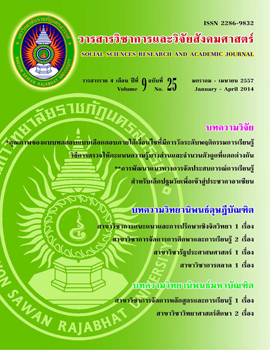รูปแบบการปรึกษากลุ่มแบบบูรณาการเพื่อพัฒนาแรงจูงใจใฝ่สัมฤทธิ์ ของนักศึกษามหาวิทยาลัยราชภัฏ
Main Article Content
Abstract
บทคัดย่อ
การวิจัยครั้งนี้มีวัตถุประสงค์เพื่อ 1) ศึกษาองค์ประกอบแรงจูงใจใฝ่สัมฤทธิ์ของนักศึกษามหาวิทยาลัยราชภัฏ 2) สร้างรูปแบบการปรึกษากลุ่มแบบบูรณาการสำหรับการพัฒนาแรงจูงใจใฝ่สัมฤทธิ์ของนักศึกษามหาวิทยาลัยราชภัฏ 3) เปรียบเทียบแรงจูงใจใฝ่สัมฤทธิ์ของนักศึกษามหาวิทยาลัยราชภัฏที่ได้รับรูปแบบการปรึกษากลุ่มแบบบูรณาการกับนักศึกษามหาวิทยาลัยราชภัฏที่ไม่ได้รับการปรึกษาใดๆ ในระยะก่อนการปรึกษา หลังการปรึกษา และหลังการติดตามผล
กลุ่มตัวอย่างที่ใช้ในการวิจัย คือ นักศึกษามหาวิทยาลัยราชภัฏ โดยแบ่งเป็น 2 กลุ่ม กลุ่มที่ 1 คือ นักศึกษามหาวิทยาลัยราชภัฏ 8 แห่ง จำนวน 960 คน กลุ่มที่ 2 คือ นักศึกษามหาวิทยาลัยราชภัฏนครสวรรค์ ที่มีคะแนนแรงจูงใจใฝ่สัมฤทธิ์ตั้งแต่เปอร์เซ็นต์ไทล์ที่ 25 ลงมา จำนวน 16 คน แบ่งเป็นกลุ่มทดลอง และกลุ่มควบคุม กลุ่มละ 8 คน เครื่องมือที่ใช้เป็นแบบวัดแรงจูงใจใฝ่สัมฤทธิ์ จำนวน 56 ข้อ มีค่าอำนาจจำแนกระหว่าง 2.407-7.222 และมีค่าความเที่ยงทั้งฉบับ เท่ากับ .9244 และรูปแบบการปรึกษากลุ่มแบบบูรณาการที่ผ่านการตรวจสอบโดยผู้เชี่ยวชาญ จำนวน 7 ท่าน สถิติที่ใช้ในการวิเคราะห์ข้อมูล ได้แก่ ค่าเฉลี่ย ค่าเบี่ยงเบนมาตรฐาน ค่าความเที่ยงตรงเชิงโครงสร้าง โดยการวิเคราะห์องค์ประกอบ
เชิงยืนยัน และค่าความแปรปรวนแบบวัดซ้ำสองทาง
ผลการวิจัยพบว่า
1. องค์ประกอบเชิงยืนยันแรงจูงใจใฝ่สัมฤทธิ์ ประกอบด้วย 4 องค์ประกอบ ได้แก่ การตั้งเป้าหมายและการวางแผนอิสระแห่งตนและกล้าตัดสินใจ การรับรู้ความสามารถของตน และความรับผิดชอบต่อตนเอง มีน้ำหนักองค์ประกอบอยู่ในเกณฑ์มาตรฐานสูง อย่างมีนัยสำคัญทางสถิติที่ระดับ .01
2. รูปแบบการปรึกษากลุ่มแบบบูรณาการ ประกอบด้วย 3 ขั้นตอน คือ ขั้นเริ่มต้น ขั้นดำเนินการ และขั้นยุติ
3. แรงจูงใจใฝ่สัมฤทธิ์โดยรวมและรายองค์ประกอบของกลุ่มทดลองที่ได้รับรูปแบบการปรึกษากลุ่มแบบบูรณาการและกลุ่มควบคุม ในระยะก่อนการทดลอง หลังการทดลอง และหลังการติดตามผล แตกต่างกันอย่างมีนัยสำคัญทางสถิติที่ระดับ .05
Abstract
The objectives of this research were to: 1) study the achievement motivation factors of Rajabhat University students, 2) build up the integrative group counseling model for developing achievement motivation of Rajabhat University students, and 3) compare the achievement motivation of Rajabhat University students who were treated by integrative group counseling model with the students who did not obtain any treatment.
The subjects were Rajabhat University students that were divided into two groups. The first group comprised 960 students from 8 Rajabhat Universities. The second group consisted of 16 Nakhon Sawan Rajabhat University students with total achievement motivation scores at the 25th percentile and lower. Accordingly, they were divided into two groups, classified as an experimental group and a control group. Each group was composed of eight students. The research instruments were a questionnaire having 56 items, with the discrimination power between 2.407-7.222 and reliability coefficient of .9244 and the integrative group counseling model approved by 7 experts. The Mean, Standard Deviation, Construct Validity by Confirmatory Factor Analysis, and Two-way Repeated ANOVA were employed for the statistical analysis.
The research findings were as follows:
1. The confirmatory factors of the achievement motivation functioning could be characterized into four factors: Goal Setting and Planning, Autonomy and Decision Making, Self-Efficacy and Self-Responsibility. These four factors had high loading at a .01 significant level.
2. The integrative group counseling model consisted of 3 stages which were Beginning stage, Operating stage and Terminating stage.
3. Subsequently, there were differences between both total achievement motivation and each of the achievement motivation components of the experiment group and the control group that were treated by the integrative group counseling before counseling, after counseling and after the follow up period at the 0.05 level of significance.


